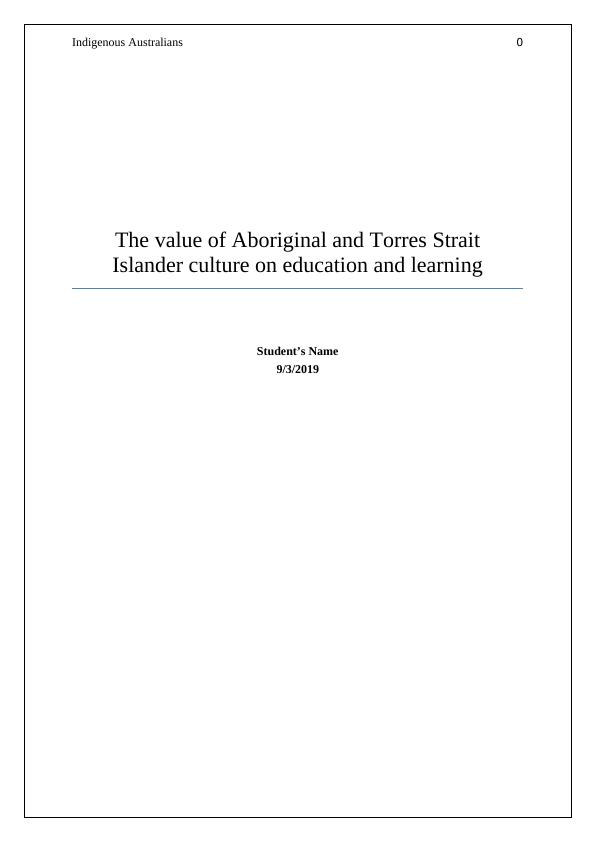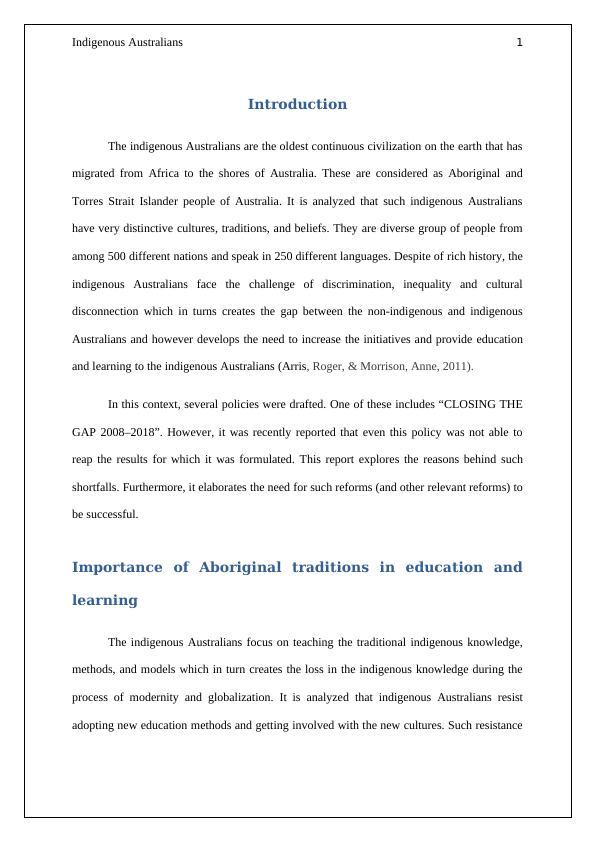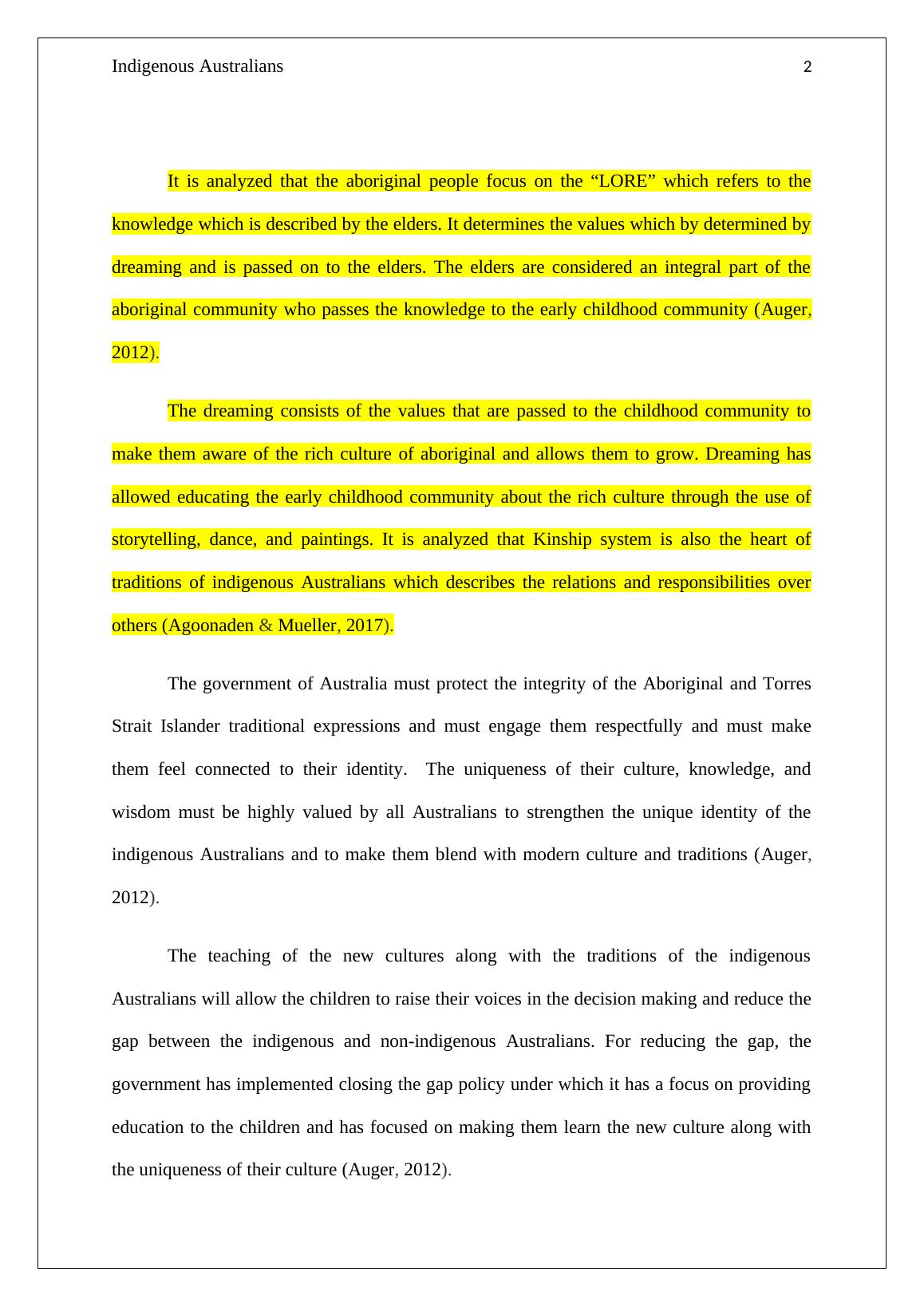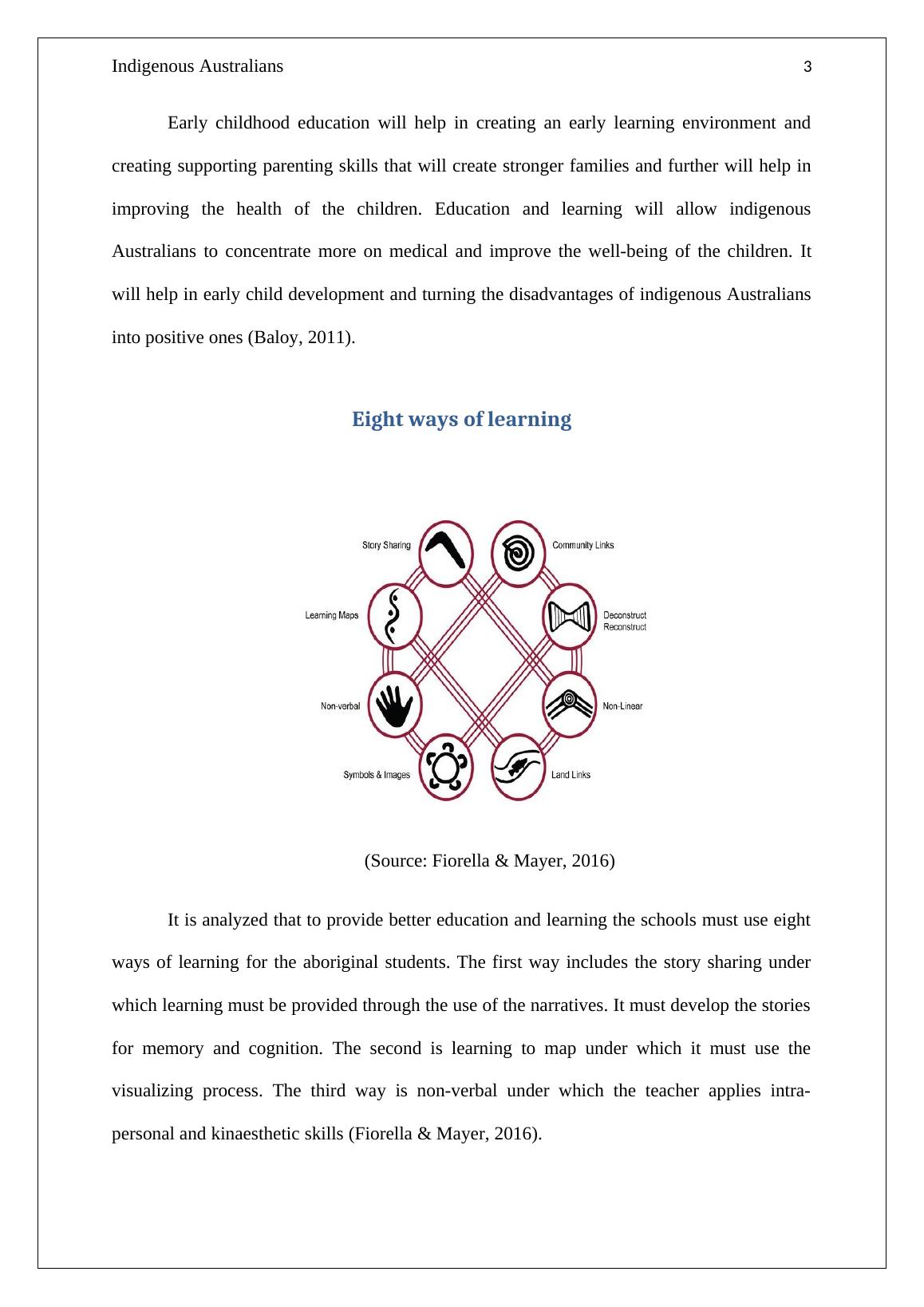The Value of Aboriginal and Torres Strait Islander Culture on Education and Learning
Added on 2022-12-21
12 Pages3126 Words42 Views
Indigenous Australians 0
The value of Aboriginal and Torres Strait
Islander culture on education and learning
Student’s Name
9/3/2019
The value of Aboriginal and Torres Strait
Islander culture on education and learning
Student’s Name
9/3/2019

Indigenous Australians 1
Introduction
The indigenous Australians are the oldest continuous civilization on the earth that has
migrated from Africa to the shores of Australia. These are considered as Aboriginal and
Torres Strait Islander people of Australia. It is analyzed that such indigenous Australians
have very distinctive cultures, traditions, and beliefs. They are diverse group of people from
among 500 different nations and speak in 250 different languages. Despite of rich history, the
indigenous Australians face the challenge of discrimination, inequality and cultural
disconnection which in turns creates the gap between the non-indigenous and indigenous
Australians and however develops the need to increase the initiatives and provide education
and learning to the indigenous Australians (Arris, Roger, & Morrison, Anne, 2011).
In this context, several policies were drafted. One of these includes “CLOSING THE
GAP 2008–2018”. However, it was recently reported that even this policy was not able to
reap the results for which it was formulated. This report explores the reasons behind such
shortfalls. Furthermore, it elaborates the need for such reforms (and other relevant reforms) to
be successful.
Importance of Aboriginal traditions in education and
learning
The indigenous Australians focus on teaching the traditional indigenous knowledge,
methods, and models which in turn creates the loss in the indigenous knowledge during the
process of modernity and globalization. It is analyzed that indigenous Australians resist
adopting new education methods and getting involved with the new cultures. Such resistance
Introduction
The indigenous Australians are the oldest continuous civilization on the earth that has
migrated from Africa to the shores of Australia. These are considered as Aboriginal and
Torres Strait Islander people of Australia. It is analyzed that such indigenous Australians
have very distinctive cultures, traditions, and beliefs. They are diverse group of people from
among 500 different nations and speak in 250 different languages. Despite of rich history, the
indigenous Australians face the challenge of discrimination, inequality and cultural
disconnection which in turns creates the gap between the non-indigenous and indigenous
Australians and however develops the need to increase the initiatives and provide education
and learning to the indigenous Australians (Arris, Roger, & Morrison, Anne, 2011).
In this context, several policies were drafted. One of these includes “CLOSING THE
GAP 2008–2018”. However, it was recently reported that even this policy was not able to
reap the results for which it was formulated. This report explores the reasons behind such
shortfalls. Furthermore, it elaborates the need for such reforms (and other relevant reforms) to
be successful.
Importance of Aboriginal traditions in education and
learning
The indigenous Australians focus on teaching the traditional indigenous knowledge,
methods, and models which in turn creates the loss in the indigenous knowledge during the
process of modernity and globalization. It is analyzed that indigenous Australians resist
adopting new education methods and getting involved with the new cultures. Such resistance

Indigenous Australians 2
creates the difficulty in embracing the new cultures and in turn loss of the improved lifestyles
and involvement of the indigenous Australians (Agoonaden & Mueller, 2017).
It is analyzed that the aboriginal people focus on the “LORE” which refers to the
knowledge which is described by the elders. It determines the values which by determined by
dreaming and is passed on to the elders. The elders are considered an integral part of the
aboriginal community who passes the knowledge to the early childhood community (Auger,
2012).
The dreaming consists of the values that are passed to the childhood community to
make them aware of the rich culture of aboriginal and allows them to grow. Dreaming has
allowed educating the early childhood community about the rich culture through the use of
storytelling, dance, and paintings. It is analyzed that Kinship system is also the heart of
traditions of indigenous Australians which describes the relations and responsibilities over
others (Agoonaden & Mueller, 2017).
The government of Australia must protect the integrity of the Aboriginal and Torres
Strait Islander traditional expressions and must engage them respectfully and must make
them feel connected to their identity. The uniqueness of their culture, knowledge, and
wisdom must be highly valued by all Australians to strengthen the unique identity of the
indigenous Australians and to make them blend with modern culture and traditions (Auger,
2012).
The teaching of the new cultures along with the traditions of the indigenous
Australians will allow the children to raise their voices in the decision making and reduce the
gap between the indigenous and non-indigenous Australians. For reducing the gap, the
creates the difficulty in embracing the new cultures and in turn loss of the improved lifestyles
and involvement of the indigenous Australians (Agoonaden & Mueller, 2017).
It is analyzed that the aboriginal people focus on the “LORE” which refers to the
knowledge which is described by the elders. It determines the values which by determined by
dreaming and is passed on to the elders. The elders are considered an integral part of the
aboriginal community who passes the knowledge to the early childhood community (Auger,
2012).
The dreaming consists of the values that are passed to the childhood community to
make them aware of the rich culture of aboriginal and allows them to grow. Dreaming has
allowed educating the early childhood community about the rich culture through the use of
storytelling, dance, and paintings. It is analyzed that Kinship system is also the heart of
traditions of indigenous Australians which describes the relations and responsibilities over
others (Agoonaden & Mueller, 2017).
The government of Australia must protect the integrity of the Aboriginal and Torres
Strait Islander traditional expressions and must engage them respectfully and must make
them feel connected to their identity. The uniqueness of their culture, knowledge, and
wisdom must be highly valued by all Australians to strengthen the unique identity of the
indigenous Australians and to make them blend with modern culture and traditions (Auger,
2012).
The teaching of the new cultures along with the traditions of the indigenous
Australians will allow the children to raise their voices in the decision making and reduce the
gap between the indigenous and non-indigenous Australians. For reducing the gap, the

Indigenous Australians 3
government has implemented closing the gap policy under which it has a focus on providing
education to the children and has focused on making them learn the new culture along with
the uniqueness of their culture (Auger, 2012).
Early childhood education will help in creating an early learning environment and
creating supporting parenting skills that will create stronger families and further will help in
improving the health of the children. Education and learning will allow indigenous
Australians to concentrate more on medical and improve the well-being of the children. It
will help in early child development and turning the disadvantages of indigenous Australians
into positive ones (Baloy, 2011).
Eight ways of learning
(Source: Fiorella & Mayer, 2016)
It is analyzed that to provide better education and learning the schools must use eight
ways of learning for the aboriginal students. The first way includes the story sharing under
which learning must be provided through the use of the narratives. It must develop the stories
government has implemented closing the gap policy under which it has a focus on providing
education to the children and has focused on making them learn the new culture along with
the uniqueness of their culture (Auger, 2012).
Early childhood education will help in creating an early learning environment and
creating supporting parenting skills that will create stronger families and further will help in
improving the health of the children. Education and learning will allow indigenous
Australians to concentrate more on medical and improve the well-being of the children. It
will help in early child development and turning the disadvantages of indigenous Australians
into positive ones (Baloy, 2011).
Eight ways of learning
(Source: Fiorella & Mayer, 2016)
It is analyzed that to provide better education and learning the schools must use eight
ways of learning for the aboriginal students. The first way includes the story sharing under
which learning must be provided through the use of the narratives. It must develop the stories

End of preview
Want to access all the pages? Upload your documents or become a member.
Related Documents
Indigenous Studies and Learning: Impact of Culture and Linguistic Background on Educationlg...
|7
|1680
|276
Aboriginal and Torres Strait Islander Culture on Educationlg...
|9
|2886
|231
Views and History of Aboriginals and Torres Strait Islander Peoplelg...
|6
|1286
|143
Critical Essay on Intercultural Understanding 2022lg...
|12
|2254
|13
Describing Indigenous Culture from Brofenbrenner's Model Essay 2022lg...
|9
|1971
|23
DIPLOMA IN EARLY CHILDHOOD EDUCATION AND CARE.lg...
|3
|343
|91
